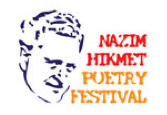
A 100 Thousand Poets for Change poster by volunteer designer Odysseas Milios (info@ijustdesign.gr)
What will you be doing this Saturday, September 24, 2011? How about taking part in what’s billed as the biggest poetry event in history?
100 Thousand Poets for Change is the unifying force behind the widely diverse and decentralized endeavors to take place on September 24. Some 600 events in 450 cities and 95 countries are planned, and the numbers are growing daily. The movement is radically inclusive—the only requirement for an associated event is that it promote some kind of environmental, social, or political change “within the framework of peace and sustainability.” In the big bucket of change, the poets and others participating decide what to do. As a sampling:
- People will chalk the sidewalks with poems in Wilmington, North Carolina.
- A dance party is planned in Greece, and drum circles will beat out hope for peace in California, New Mexico, Nigeria, Jamaica, and Gambia.
- A poet will sit at a typewriter in an independent bookstore and produce poems on demand—while dressed as the Poetry Fox. (Don’t worry if you aren’t sure what a Poetry Fox looks like. My understanding is they’re exceptionally rare.)
- At least two poets are planning to read poems while flying commercially (on different flights).
- Another poet plans to read a poem to an Eastern seaboard marsh she’ll drive past on that Saturday.
- And there are literally hundreds of readings, slams, open mics, and workshops around the world.
While I’m hoping to do more on September 24, I plan at a minimum to participate in an effort to inundate with poetry the inboxes of state and local government offices in North Carolina (where I live). Poets and poetry lovers are encouraged to e-mail poems to their elected representatives. Poets Joseph Bathanti and Kathryn Kirkpatrick, North Carolina organizers of the mass e-mailing effort, explain the details:
Please use the poem’s title for the subject line, and place the poem itself in the body of the e-mail, with your name and the town you live in at the bottom of it. No additional message should be inserted. Our aim is for the poems themselves to be the message. The poem you elect to send does not have to be political, per se, though it can be argued that all poems are political. Of course the subject matter remains solely your choice. We request, however, that this action be one that underscores our dignity as poets and the integrity of our art. Our intention is not to shout at our politicians, or in any way insult them, but to present a powerful united advocacy for change—and to alert them to our constituency.
I already have my poem picked—it’s one I’ve had memorized for years, and it seems to fit the bill. (Be sure to read “7 Reasons to Memorize Some Poetry” on Jeff Cobb’s Mission to Learn blog, if you haven’t already.)
In Place of a Curse
by John Ciardi
At the next vacancy for God, if I am elected,
I shall forgive last the delicately wounded
who, having been slugged no harder than anyone else,
never got up again, neither to fight back,
nor to finger their jaws in painful admiration.
They who are wholly broken, and they in whom
mercy is understanding, I shall embrace at once
and lead to pillows in heaven. But they who are
the meek by trade, baiting the best of their betters
with extortions of a mock-helplessness,
I shall take last to love, and never wholly.
Let them all in Heaven—I abolish Hell—
but let it be read over them as they enter:
“Beware the calculations of the meek, who gambled nothing,
gave nothing, and could never receive enough.”
So what will you be doing September 24? Whether you live in North Carolina or no, whether you’re a poet or not, you can e-mail your legislators a poem. Or you can find some local happening at http://www.100TPC.org. Or you can organize your own. We’d love to hear what you plan to do—so let us know by leaving a comment.
*******
This post was originally published on Mission to Learn. I recommend the Mission to Learn blog, which is dedicated to lifelong learning.




 Up to your shoulder inside a cow, you feel the hot heavy squeeze of her, but I’ll never forget my startled delight the first time I withdrew my hand slowly and felt the cow’s muscles contract and release one after another, like a row of people shaking hands with me in a receiving line.
Up to your shoulder inside a cow, you feel the hot heavy squeeze of her, but I’ll never forget my startled delight the first time I withdrew my hand slowly and felt the cow’s muscles contract and release one after another, like a row of people shaking hands with me in a receiving line.